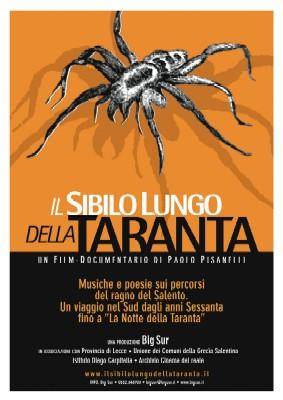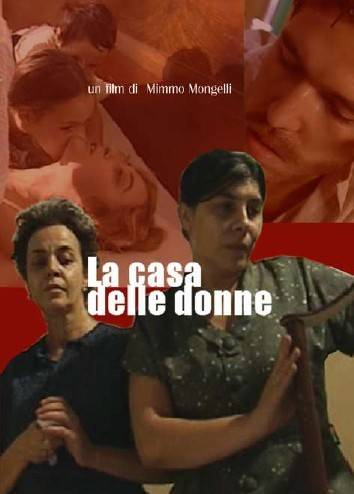Puglia Film Festival 2009. Italy’s Heel on the Big Screen
Sometimes traveling to Italy is not necessary in order to discover its beauty. You can just sit in front of a wide screen and take in the beautiful landscape while experiencing life in the old country from the point of view of the characters in the film. This summer you can start your Italian journey in the Region of Puglia, the heel of Italy.
From July 14-18, the Calandra Italian American Institute, Queens College/CUNY will host Terra 3, Puglia Film Festival 2009 , an event dedicated to new cinema and emerging talent from the area. The festival, already presented in Australia and Canada by Mimmo Mongelli, President of the Levante Film Festival and the founder and artistic director of the initiative, is based on one central theme: Mongelli’s relationship with Puglia as his land of origin and the sea that surrounds the region on three sides become symbols of his roots as well as a vehicle to escape a difficult life. This powerful and emotional bond will also be depicted in two photo exhibits hosted at the Calandra Institute in connection with the film festival. “Bari Photo Camera” and “From Land to Land: Apulian Emigration in the 20th Century” are both on display throughout the five days of the festival.
The event will be inaugurated on July 14 by John Mustaro, President of the United Pugliesi Federation which unites 20 Pugliese associations in the New York metropolitan area, Fred Gardaphé, Distinguished Professor of Italian American Studies, Queens College/CUNY, and Professor Anthony Tamburri, Dean of the Calandra Italian American Institute. Artistic Director Mongelli will also give a brief overview of the festival and this year’s program.
Throughout the festival, film screenings will alternate with lectures by experts in the field and representatives of the Pugliese community in the U.S. Menino Coppi, president of the association Turesi Nel Mondo will analyze the phenomenon of emigration in the third millennium; Antonio Barile, councilor at the Puglia Chamber of Commerce and President of the Board of Directors of the magazine Bari Economica will discuss the current promotion of artistic and cultural activities in Italy; Marco Sportelli, member of the Province’s Council, will comment on the relationship between culture and public institutions; and Carlo Gentile will speak about perceptions of Italian cinema in the world.
Among the fifteen works on the calendar , four are full-length feature films (Bell’epoker by Nico Cirasola; I galantuomini by Edoardo Winspeare; La casa delle donne by Mimmo Mongelli and Pinuccio Lovero; and Sogno di una morte di mezza estate by Pippo Mezzapesa); seven are documentaries (Emigranti by Mario Tani and Domenico Rodolfo; Il sibilo lungo della tarantola by Paolo Pisanelli; Le donne della Torre Pelosa by Antonella Maddalena; Le storie cantate by Nicola Morisco and Daniele Trevisi; Radio Egnatia by Davide Barletti; Sound Res. I giorni del suono by Ippolito Chiarello; Un rumore di gabbiani by Giuseppe Cristaldi); and four are short films (H5N1 by Roberto De Feo; U su’ by Mimmo Mancini; Vietato fermarsi by Pierluigi Ferrandini; Watch! by Mimmo Mongelli).
On the eve of the festival, we met with Dean Antony Tamburri who discussed the merits of the initiative, its goals, and the perception of Italian national and regional cinema in the Unites States
What is the main aim of the festival?
One of the ideas is to take Puglia’s creativity and present it to the world. This year’s festival features movies that have already been presented in both Australia and Canada, with some older productions replaced by new ones. This event also allows short films to be shown to a wider audience; this is important since short films are usually only shown during festivals or in university settings and at institutes like the Calandra. They are not commonly screened in theaters so this is a great opportunity to introduce them to the general public.
Why is the Calandra Institute sponsoring and hosting the event?
It creates a perfect synergy between this region in Italy which wants to promote its cinema outside the country in the United States. There is also a large Pugliese population in the United States, particularly in the greater New York metropolitan area and Chicago.
Why is it so important to introduce Puglia cinema in America?
It allows Italian-Americans who are not familiar with contemporary Italy to glimpse through a window and get an idea of the current cultural and social conditions within the country. Moreover, this festival meets two needs within the Italian American community. The first is that Italian-Americans can learn more about the history of Italy than what they have heard from their parents and grandparents; the second is that they will know more about modern Italy and not just the conditions in Italy during their ancestors’ time. Plus, an initiative like this becomes a vehicle to learn about the different local and regional cultures that in some areas of Italy are stronger than the national culture. People are getting more and more interested in this as globalization takes over. Local traditions go beyond geographical borders and are spread and promoted abroad, according to what is commonly referred as the new phenomenon of “glocalization.”
Do you think that contemporary cinema can actually and realistically mirror Italian contemporary culture?
I think that Italian cinema, like any form of art, can be not only a mirror of what is going on in Italian society, but it can also tell us what Italians think of Italian Americans, as it appears in some of these films. There is one film that I can mention as an example. It is Verzì’s “My name is Tanino,” in which Italian Americans are represented in a very stereotypical way. We are still working on dismantling them but we are commonly considered “oversensitive” on the issue.
What kind of audience does this initiative hope to attract?
Of course Italians and Italian Americans living in the U.S., but non-Italians as well: all people who love Italy or have a passion for Italian cinema should be interested in attending these kinds of events.
The Festival is sponsored by Camera di Commercio Industria, Artigianato e Agricoltura di Bari; Regione Puglia Assessorato al Mediterraneo; Provincia di Bari Presidenza del Consiglio; The United Pugliesi Federation of the Metropolitan Area; Calandra Italian American Institute; Westchester Italian Cultural Center; Guild of Italian American Actors; Pugliesi nel Mondo; Federazione Italiana Lavoratori Emigranti e Famiglie; Associazione Turesi nel Mondo; and Confederazione Italiana Agricoltori
The event will be hosted by the Calandra Italian American Institute (July 14-15-17-18) and the Westchester Italian Cultural Center (July 16).
John D. Calandra Italian American Institute
25 West 43rd Street, 17th floor, Manhattan
RSVP: (212) 642-2094
Westchester Italian Cultural Center
One Generoso Pope Place, Tuckahoe, New York
Information: (914) 771-8700
FULL PROGRAM SCHEDULE
Tuesday, July 14, 2009 – Calandra Italian American Institute
4:30 pm – Opening: John Mustaro (United Pugliesi Federation of Metropolitan Area); Fred Gardaphé and Anthony Tamburri (John D. Calandra Italian American Institute, Queens College/CUNY).
5:00 pm – Lecture: Apulian Cinema by Mimmo Mongelli (LIFF)
6:00 pm – Emigranti (Emigrants) by Mario Tani, Domenico Rodolfo (2008)
6:30 pm – Sound Res. I Giorni del Suono (Sound Res. Sound Days) by Ippolito Chiarello (2006)
7:30 pm – Watch! By Mimmo Mongelli (2008)
Wednesday, July 15, 2009 – Calandra Italian American Institute
4:00 pm – Lecture: The Emigration in the Third Millennium by Menino Coppi (Associazione Turesi nel Mondo)
5:00 pm Pinuccio Lovero, Sogno di Una Morte Di Mezza Estate (Pinuccio Lovero, A Midsummer Death’s Dream) by Pippo Mezzapesa (2008)
6:15 pm – La Casa delle Donne (Women’s House) by Mimmo Mongelli (2003)
Thursday, July 16, 2009 – Westchester Italian Cultural Center
6:15 pm – Lecture: Production Activity and Cultural Activity by Antonio Barile (CCIAA)
7:15 pm – Un Rumore di Gabbiani (A Seagull’s Noise) by Giuseppe Cristaldi (2008)
8:30 pm – Bell’Epoker by Nico Cirasola (2005)
Friday, July 17, 2009 – Calandra Italian American Institute
4:00 pm – Lecture: Institutions and Culture by Marco Sportelli (President of the Counsel of Provincia di Bari)
5:00 pm – Radio Egnatia by Davide Barletti (2008)
6:15 pm – Il Sibilo Lungo Della Taranta (The Long Hiss of the Tarantula) by Paolo Pisanelli (2004)
Saturday, July 18, 2009 – Calandra Italian American Institute
4:00 pm – Lecture: Italian Cinema Around the World by Carlo Gentile (SNCCI)
5:00 pm – H5N1 by Roberto De Feo (2007)
5:30 pm – U Su’ by Mimmo Mancini (2007)
5:50 pm – Le Donne della Torre Pelosa (Women from Torre Pelosa) by Antonella Maddalena (2008)
6:30 pm – Vietato Fermarsi (Don’t Stop) by Pierluigi Ferrandini (2007)
6:40 pm – Storie Cantate (Stories by Song) by Nicola Morisco, Daniele Trevisi (2007)
7:30 pm – I Galantuomini (The Gentlemen) by Edoardo Winspeare (2008)
All films are in Italian with English subtitles.












































i-Italy
Facebook
Google+
This work may not be reproduced, in whole or in part, without prior written permission.
Questo lavoro non può essere riprodotto, in tutto o in parte, senza permesso scritto.